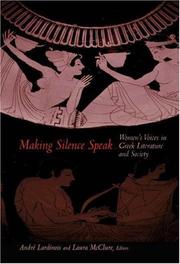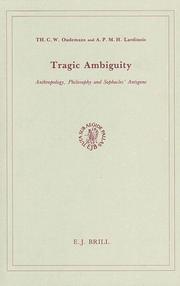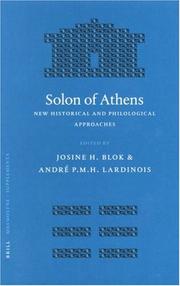| Listing 1 - 10 of 14 | << page >> |
Sort by
|
Book
ISBN: 9004314830 9004311629 9789004314832 9789004311626 Year: 2016 Volume: 392 2 Publisher: Leiden: Brill,
Abstract | Keywords | Export | Availability | Bookmark
 Loading...
Loading...Choose an application
- Reference Manager
- EndNote
- RefWorks (Direct export to RefWorks)
In The Newest Sappho Anton Bierl and André Lardinois have edited 21 papers of world-renowned Sappho scholars dealing with the new papyrus fragments of Sappho that were published in 2014. This set of papyrus fragments, the greatest find of Sappho fragments since the beginning of the 20th century, provides significant new readings and additions to five previously known songs of Sappho (frs. 5, 9, 16, 17 and 18), as well as the remains of four previously unknown songs, including the new Brothers Song and the Kypris Song. The contributors discuss the content of these poems as well as the consequence they have for our understanding of Sappho’s life and work.
Greek poetry --- Manuscripts --- Sappho --- Greek literature --- Manuscripts. --- Criticism and interpretation. --- Sapfo --- Sapfo van Lesbos --- Sappho van Lesbos --- Sapho --- Safo --- Sapʻo --- Saffo --- Sapphus --- Сафо --- سيفو --- Safona --- Σαπφῶ --- Ψάπφω --- Psappho --- Greek poetry - Manuscripts --- Sappho - Manuscripts --- Literary studies: classical, early & medieval --- Criticism and interpretation
Book
ISBN: 9780691187594 Year: 2018 Publisher: Princeton, NJ
Abstract | Keywords | Export | Availability | Bookmark
 Loading...
Loading...Choose an application
- Reference Manager
- EndNote
- RefWorks (Direct export to RefWorks)
Multi
ISBN: 9780691187594 Year: 2018 Publisher: Princeton, N.J. Princeton University Press
Abstract | Keywords | Export | Availability | Bookmark
 Loading...
Loading...Choose an application
- Reference Manager
- EndNote
- RefWorks (Direct export to RefWorks)
Literature --- History

ISBN: 069100465X 0691004668 9780691004662 0691187592 Year: 2001 Publisher: Princeton (N.J.): Princeton university press,
Abstract | Keywords | Export | Availability | Bookmark
 Loading...
Loading...Choose an application
- Reference Manager
- EndNote
- RefWorks (Direct export to RefWorks)
This collection attempts to recover the voices of women in antiquity from a variety of perspectives: how they spoke, where they could be heard, and how their speech was adopted in literature and public discourse. Rather than confirming the old model of binary oppositions in which women's speech was viewed as insignificant and subordinate to male discourse, these essays reveal a dynamic and potentially explosive interrelation between women's speech and the realm of literary production, religion, and oratory. The contributors use a variety of methodologies to mine a diverse array of sources, from Homeric epic to fictional letters of the second sophistic period and from actual letters written by women in Hellenistic Egypt to the poetry of Sappho. Throughout, the term "voice" is used in its broadest definition. It includes not only the few remaining genuine women's voices but also the ways in which male authors render women's speech and the social assumptions such representations reflect and reinforce. These essays therefore explore how fictional female voices can serve to negotiate complex social, epistemological, and aesthetic issues. The contributors include Josine Blok, Raffaella Cribiore, Michael Gagarin, Mark Griffith, André Lardinois, Richard Martin, Lisa Maurizio, Laura McClure, D. M. O'Higgins, Patricia Rosenmeyer, Marilyn Skinner, Eva Stehle, and Nancy Worman.
Greek literature --- Women and literature --- Women --- Greek language --- Speech in literature. --- Women in literature. --- Littérature grecque --- Femmes et littérature --- Femmes --- Grec --- Parole dans la littérature --- Femmes dans la littérature --- History and criticism. --- Women authors --- History and criticism --- Social conditions. --- Spoken Greek. --- Histoire et critique --- Femmes écrivains --- Conditions sociales --- Grec parlé --- Intellectual life. --- Littérature grecque --- Femmes et littérature --- Parole dans la littérature --- Femmes dans la littérature --- Femmes écrivains --- Grec parlé --- Poetry --- Fiction --- Thematology --- Sociology of the family. Sociology of sexuality --- Antiquity --- Speech in literature --- Women in literature --- Human females --- Wimmin --- Woman --- Womon --- Womyn --- Females --- Human beings --- Femininity --- Woman (Christian theology) in literature --- Women in drama --- Women in poetry --- Balkan literature --- Byzantine literature --- Classical literature --- Classical philology --- Greek philology --- Classical languages --- Indo-European languages --- Spoken Greek --- Women authors&delete& --- Intellectual life --- Social conditions --- Sappho of Lesbos --- Greek literature - History and criticism. --- Women and literature - Greece. --- Greek literature - Women authors - History and criticism. --- Women - Greece - Intellectual life. --- Women - Greece - Social conditions. --- Greek language - Spoken Greek. --- Dans la littérature --- Histoire --- Grèce --- Literature --- Writers --- Images of women --- Book --- Dans la littérature --- Grèce
Book
ISBN: 9090167196 Year: 2002 Publisher: Nijmegen : Katholieke Universiteit Nijmegen,
Abstract | Keywords | Export | Availability | Bookmark
 Loading...
Loading...Choose an application
- Reference Manager
- EndNote
- RefWorks (Direct export to RefWorks)
Book
Year: 2002 Publisher: Nijmegen Katholieke universiteit Nijmegen
Abstract | Keywords | Export | Availability | Bookmark
 Loading...
Loading...Choose an application
- Reference Manager
- EndNote
- RefWorks (Direct export to RefWorks)
Book
ISBN: 9781107023598 1107023599 9781139151788 1322066167 1139904531 1139898590 113990647X 1139922076 1139910337 1139151789 113990258X 1139918184 Year: 2014 Publisher: Cambridge: Cambridge university press,
Abstract | Keywords | Export | Availability | Bookmark
 Loading...
Loading...Choose an application
- Reference Manager
- EndNote
- RefWorks (Direct export to RefWorks)
Sappho, the earliest and most famous Greek woman poet, sang her songs around 600 BCE on the island of Lesbos. Of the little that survives from the approximately nine papyrus scrolls collected in antiquity, all is translated here: substantial poems, fragments, single words - and, notably, five stanzas of a poem that came to light in 2014. Also included are new additions to five fragments from the latest discovery, and a nearly complete poem published in 2004. The power of Sappho’s poetry - her direct style, rich imagery, and passion - is apparent even in these remnants. Diane Rayor’s translations of Greek poetry are graceful and poetic, modern in diction yet faithful to the originals. The full range of Sappho’s voice is heard in these poems about desire, friendship, rivalry, family, and "passion for the light of life". In the introduction and notes, internationally respected Sappho scholar André Lardinois presents plausible reconstructions of Sappho’s life and work, the importance of the recent discoveries in understanding the performance of her songs, and the story of how these fragments survived.
Greek poetry --- Poésie grecque --- Translations into English. --- Traductions anglaises --- Sappho --- Criticism and interpretation. --- Poésie grecque --- Greek poetry - Translations into English --- Sappho - Translations into English --- Greek poetry. --- Sappho. --- Greek literature --- Safo --- Sapʻo --- Saffo --- Sapphus --- Sapfo --- Сафо --- سيفو --- Safona --- Sapho --- Σαπφῶ --- Ψάπφω --- Psappho --- Sapfo van Lesbos --- Sappho van Lesbos

ISBN: 9004084177 9004246533 9789004084179 Year: 1987 Volume: 4 Publisher: Leiden: Brill,
Abstract | Keywords | Export | Availability | Bookmark
 Loading...
Loading...Choose an application
- Reference Manager
- EndNote
- RefWorks (Direct export to RefWorks)
Philosophical anthropology --- Sophocles --- Ambiguity in literature --- Ambiguïteit in de literatuur --- Ambiguïté dans la littérature --- Antigone (Legendary character) in literature --- Antigone (Personnage de legende) dans la litterature --- Antigone (Sagenfiguur) in de literatuur --- Cosmologie de l'Antiquité dans la littérature --- Cosmology [Ancient ] in literature --- Kosmologie van de Oudheid in de literatuur --- Tragic [The ] in literature --- Tragique [Le ] dans la litterature --- Tragische [Het ] in de literatuur --- Antigone (Greek mythology) in literature --- Cosmology, Ancient, in literature --- Tragic, The, in literature --- Antigone (Mythologie grecque) dans la littérature --- Cosmologie antique dans la littérature --- Tragique dans la littérature --- Sophocles. --- Ambiguity in literature. --- Antigone (Greek mythology) in literature. --- Cosmology, Ancient, in literature. --- Tragic, The, in literature. --- Sofokles --- Sophocle --- Sofocle --- Sophokles --- Sofocles --- Antigone (Mythologie grecque) dans la littérature --- Cosmologie antique dans la littérature --- Tragique dans la littérature --- Ambiguïté dans la littérature --- Antigone --- In literature. --- Sophocles - Antigone

ISBN: 9004149546 9789004205727 9789004149540 9786611397111 1281397113 9047408896 9789047408895 9781281397119 6611397116 9004205721 Year: 2006 Volume: 272. Publisher: Leiden: Brill,
Abstract | Keywords | Export | Availability | Bookmark
 Loading...
Loading...Choose an application
- Reference Manager
- EndNote
- RefWorks (Direct export to RefWorks)
This volume offers a range of innovative approaches to Solon of Athens, legendary law-giver, statesman, and poet of the early sixth century B.C. In the first part, Solon’s poetry is reconsidered against the background of oral poetics and other early Greek poetry. The connection between Solon’s alleged roles as poet and as politician is fundamentally questioned. Part two offers a reassessment of Solon’s laws based on a revision of the textual tradition and recent views on early Greek lawgiving. In part three, fresh scrutiny of the archeological and written evidence of archaic Greece results in new perspectives on the agricultural crisis and Solon’s role in the social and political developments of sixth-century Athens. Originally published in hardcover
Politics and literature --- Greek literature --- History and criticism --- Solon, --- Criticism and interpretation --- Athens (Greece) --- Intellectual life --- Politics and government --- Literature --- Literature and politics --- Political aspects --- Solone, --- Aḟiny (Greece) --- Atene (Greece) --- Atʻēnkʻ (Greece) --- Ateny (Greece) --- Athen (Greece) --- Athēna (Greece) --- Athēnai (Greece) --- Athènes (Greece) --- Athinai (Greece) --- Athīnā (Greece) --- Greek poetry --- Law, Greek --- Politique et littérature --- Poésie grecque --- Droit grec --- Congresses --- Congrès --- Histoire et critique --- Congresses. --- Athènes (Grèce) --- Vie intellectuelle --- Politique et gouvernement --- Solon --- Greece --- Αθήνα (Greece) --- Solon Atheniensis --- Solon van Athene --- Soloon --- Soloon van Athene --- Greek literature. --- Intellectual life. --- Politics and government. --- Politics and literature. --- Cultural life --- Culture --- Balkan literature --- Byzantine literature --- Classical literature --- Classical philology --- Greek philology --- Greece. --- al-Yūnān --- Ancient Greece --- Ellada --- Ellas --- Ellēnikē Dēmokratia --- Elliniki Dimokratia --- Grčija --- Grèce --- Grecia --- Gret͡sii͡ --- Griechenland --- Hellada --- Hellas --- Hellenic Republic --- Hellēnikē Dēmokratia --- Kingdom of Greece --- République hellénique --- Royaume de Grèce --- Vasileion tēs Hellados --- Xila --- Yaṿan --- Yūnān --- Politics and literature - Greece --- Greek literature - History and criticism --- Solon, - ca. 630-ca. 560 B.C. --- Solon, - ca. 630-ca. 560 B.C. - Criticism and interpretation --- Athens (Greece) - Intellectual life --- Athens (Greece) - Politics and government
Book
ISBN: 9004270809 9004270841 9789004270848 9789004270800 Year: 2015 Publisher: Leiden Brill
Abstract | Keywords | Export | Availability | Bookmark
 Loading...
Loading...Choose an application
- Reference Manager
- EndNote
- RefWorks (Direct export to RefWorks)
The papers collected in this volume study the function and meaning of narrative texts from a variety of perspectives. The word “text” is used here in the broadest sense of the term: it denotes literary books, but also oral tales, speeches, newspaper articles and comics. One of the purposes of this volume is to discover what these different texts have in common. The texts are approached from four main perspectives: New Philology, Linguistics, Iconography and Reception studies. Contributors come from diverse disciplines, such as Classical Studies, Medieval Studies, English literature, Philosophy, Religious Studies, Cultural Studies, Art History, Linguistics, and Communication and Information Studies, all united in a common purpose to understand the workings of narrative texts.
Discourse analysis, Narrative. --- Comprehension (Theory of knowledge) --- Linguistique comparée --- Compréhension (Théorie de la connaissance) --- Oral communiction. --- Linguistique comparée --- Compréhension (Théorie de la connaissance) --- Interdisciplinarité --- Oral communiction --- Narration (Rhetoric) --- Meaning (Philosophy) --- Comparative linguistics. --- Interdisciplinary approach to knowledge. --- Discourse analysis, Narrative --- Comparative linguistics --- Interdisciplinary approach to knowledge --- Languages & Literatures --- Philology & Linguistics --- Knowledge, Theory of --- Methodology --- Science and the humanities --- Comparative philology --- Philology, Comparative --- Historical linguistics --- Narrative discourse analysis --- Logic --- Philosophy --- Semantics (Philosophy) --- Narrative (Rhetoric) --- Narrative writing --- Rhetoric --- Narratees (Rhetoric) --- Oral communication. --- Oral communication --- Oral transmission --- Speech communication --- Verbal communication --- Communication --- History of civilization --- Theory of knowledge --- Literature --- Discours narratif --- Narration --- Signification (Philosophie) --- humanities --- Paris --- Proclus
| Listing 1 - 10 of 14 | << page >> |
Sort by
|

 Search
Search Feedback
Feedback About UniCat
About UniCat  Help
Help News
News